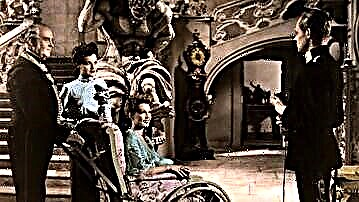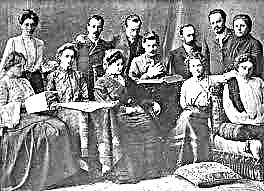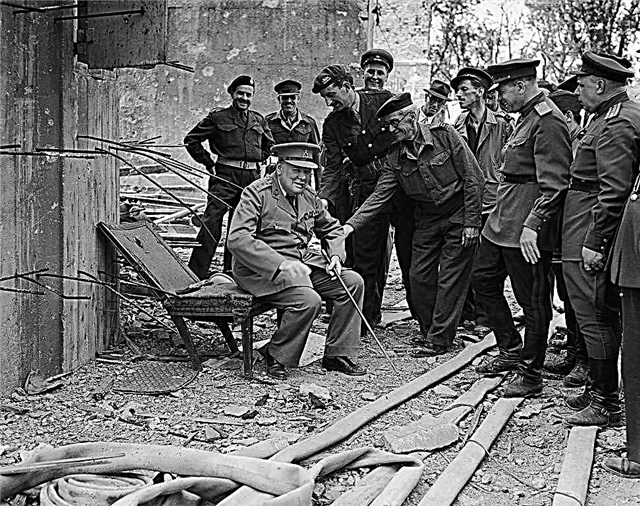In the prologue, the Foreigner inquires from the Nobleman who composed the comedy that is about to be played: several names are named (among others Alamanni, Ariosto, Bembo, Tasso), and then the Nobleman announces that the play was written by Pietro Aretino. It tells of two tricks committed in Rome - and this city lives in a different manner than Athens - so the comic style of the ancient authors is not fully observed.
Messer Mako and his servant immediately enter the scene. From the first words it becomes clear: the Sienese youth is so stupid that only the lazy one will not deceive him. He immediately informs the artist Andrea about his cherished goal of becoming a cardinal and agreeing with the king of France (with a pope, a more practical servant clarifies). Andrea advises to turn into a courtier, because Messer Mako clearly does honor to his homeland (the natives of Siena were considered dull). Inspired by Mako orders to buy a book about the courtiers from the street peddler (the servant brings an essay on the Turks) and looks at the beauty in the window: it is not otherwise the Duchess of Rome - you need to deal with it when the court manners are mastered.
Servants of Parabolano appear - this noble Signor languishes with love, and it is he who is destined to become a victim of the second trick. The stirrup Rosso will sincerely honor his master for stinginess, complacency and hypocrisy. Valerio and Flamminio reproach the owner for their trust in the rogue Rosso. Rosso immediately demonstrates his qualities: having agreed on the sale of lampreys, he informs the clerk of St. Peter's Basil that demons have settled in the fisherman - not having time to rejoice at how cleverly cheated the buyer, the poor fellow falls into the clutches of churchmen.
Master Andrea sets about training Mako. Learning court manners is not easy: you need to be able to swear, be envious and depraved, evil-spoken and ungrateful. The first action ends with the cries of a fisherman who was nearly killed expelling demons: the unfortunate damns Rome, as well as all who live in it, who love it and who believe in it.
In the following three acts, the intrigue develops in the alternation of scenes from Roman life. Master Andrea explains to Mako that Rome is a real mess, the flamminio shares his sore point with the old Sempronio: in the old days it was a pleasure to serve, because it was worth a decent reward, and now everyone is ready to gobble up each other. In response, Sempronio notes that it is now better to be in hell than at court.
Having overheard how Parabolano repeats the name of Libya in a dream, Rosso hurries to Alvidge - a procurator, ready to seduce chastity itself. Alvija is in sorrow: her mentor, a harmless old woman who was only guilty of poisoning her godmother, drowned a baby in the river and turned her neck around, was condemned to be burned, but on Christmas Eve she always behaved impeccably, and in Great Lent she didn’t allowed. Expressing sympathy in this bereavement, Rosso offers to get down to business: Alvija may well impersonate the nurse of Libya and assure the owner that the beauty is drying for him. Valerio also wants to help Parabolano and advises sending a gentle message to the subject of passion: current women let lovers right in the door, almost with the knowledge of her husband - morals in Italy have fallen so much that even siblings mate with each other without a twinge of conscience.
Master Andrea has his own joys: Messer Mako fell in love with a noble lady - Camille and writes hilarious poems. Siena's fool is surely waiting for an unprecedented success at court, for he is not just a boob, but a boob for twenty-four carats. Having conspired with a friend of Dzoppino, the artist assures Mako that Camilla is exhausted from passion for him, but agrees to accept him only in the clothes of a porter. Mako willingly changes his dress with a servant, and dressed up as a Spaniard, Dzoppino shouts that the city has announced the search for the spy Mako, who arrived from Siena without a passport, the governor ordered the villain to be robbed. Under the laughter of the jokers, Mako escapes into all his shoulder blades.
Rosso leads to master Alvidge. The ball easily extorts a necklace from a lover and paints how Livia languishes on it - the poor thing eagerly awaits the night, for she firmly decided either to stop suffering or die. The conversation is interrupted by the appearance of Mako in the clothes of a porter: after learning about his misadventures, Parabolano vows to take revenge on the loafer Andrea. Alvija is amazed at the credulity of the noble Signor, and Rosso explains that this narcissistic donkey sincerely believes that any woman should run after him. Alvija decides to slip Arkolano’s baker’s wife instead of Libya - a tidbit, you’ll lick your fingers! Rosso says that gentlemen have less taste than the dead, everyone swallows with joy!
Honest servants Valerio and Flamminio have a sorrowful conversation about modern morals. Flamminio declares that he decided to leave Rome - a den of dishonor and debauchery. You need to live in Venice - this is a holy city, a real earthly paradise, a haven of reason, nobility and talent. No wonder it was only there that the divine Pietro Aretino and the sorcerer Titian were duly appreciated.
Rosso tells Parabolano that everything is ready for a date, but the bashful Livia begs to work with her in the dark - a well-known thing, all women first break down, and then they are ready to surrender even in St. Peter's Square. Alvija, on the eve of a stormy night, hurries to see the confessor and finds out, to her great joy, that the mentor also managed to save her soul: if the old woman is really burned, she will be Alvije a good intercessor in the world, as she was in this.
Master Andrea explains that Mako was stupid, fleeing at the most inopportune moment - after all, the pretty Camilla was looking forward to it! Tired of too much training, Mako asks to be melted down to the court as soon as possible, and Andrea readily leads the ward to the Master Mercurio. Fraudsters feed Sienza laxative pills and put in a cauldron.
Rosso asks Alviju about a small service - to slander Valerio’s sally. The swarm complains to Parabolano that the villain Valerio warned the brother of Libya, a desperate thug who had already managed to kill four dozen guards and five bailiffs. But for the sake of such a noble Signor, she is ready for anything - let the brother of Libya finish her off, at least it will be possible to forget about poverty! Parabolano immediately gives Alvidge a diamond, and the amazed Valerio kicks out of the house. Alvija, meanwhile, conspires with Tonia. The baker is happy about the opportunity to annoy her drunken husband, and Arkolano, sensing something was amiss, decides to follow the zealous wife.
In anticipation of news from the swarms, Rosso does not waste time in vain: encountering a Jew-junker, he is looking at the satin vest and immediately fuses the unlucky merchant into the hands of the guards. Then, a quick servant informs Parabolano that at seven and a quarter they are waiting for him in the house of the virtuous Madonna Alvigi - the matter was sweetened to everyone's pleasure.
Messer Mako almost turns inside out from the pills, but he is so pleased with the operation that he wants to break the cauldron - out of fear, no matter how others take advantage. When they bring him a concave mirror, he becomes horrified - and calms down only by looking at an ordinary mirror. Having declared that he wants to become not only a cardinal, but also a pope, Messer Mako begins to burst into the house of the beauty he liked, who, of course, does not dare to refuse the court cavalier.
In the fifth act, all the storylines converge. The inconsolable Valerio curses the capital’s morals: as soon as the owner showed disfavor, the servants showed her true face - everyone eagerly tries to insult and humiliate. Tonya, dressed in her husband’s clothes, indulges in bitter thoughts about the female share: how much you have to endure from useless and jealous husbands! The master Andrea and Dzoppino, wanting to teach Mako a little lesson, burst into the beauty's house under the guise of Spanish soldiers - the poor Sienese jumps out of the window in his underwear and once again flees. Arcolano, having lost his pants, curses his wife’s dress with curses and ambushes at the bridge.
Alvija invites Parabolano to his little darling - the poor thing is so afraid of her brother that she appeared in men's clothing. Parabolano rushes to his beloved, and Rosso and Alvija gladly wash his bones. Then Rosso begins to complain about the meager life in Rome - it is a pity that the Spaniards did not wipe this vile city off the face of the earth! Hearing the cries of Parabolano, who finally saw his beloved, the swarm and the fraudster rush to the hilt. The first grab Alviju, she brings everything to Rosso, and Tonya insists that she was dragged here by force. Faithful Valerio offers the owner himself to tell about this clever trick - then they will laugh less at him. Cured of love, Parabolano follows sound advice and, to begin with, pacifies the furious Arcolano, who longs to crack down on his unfaithful wife. Following the deceived baker, Messer Mako bursts into the scene in one of his underwear, and master Andrea runs behind him with clothes in his hands. The artist swears that he is not a Spaniard at all - on the contrary, he managed to kill the robbers and select the stolen. Rosso appears immediately, followed by a fisherman and a Jew. The servant begs forgiveness from Parabolano, and he declares that the beautiful comedy should not have a tragic end: therefore Messer Mako should make peace with Andrea, and the baker should recognize Tonya as a faithful and virtuous wife. Rosso deserves mercy for his extraordinary cunning, but he should pay the fisherman and the Jew. The restless Alvija promises to get such a cutie for a good signor that Libya is not good at noticing. Parabolano laughingly rejects the services of the pimp and invites the whole company for dinner to enjoy this unparalleled farce together.








 How to work 4 hours a week
How to work 4 hours a week


